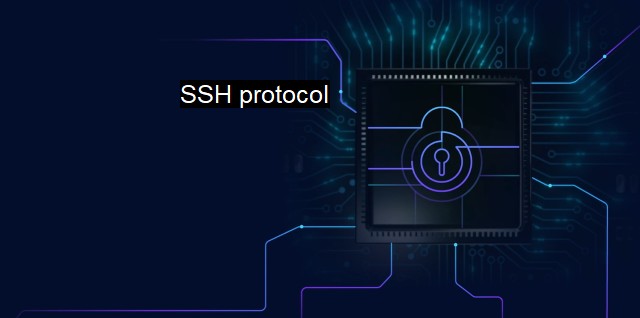What is SSH protocol?
Understanding SSH Protocol: A Secure and Efficient Approach to Remote Control and Network Communication
The Secure Shell Protocol also known as SSH is an invaluable network protocol tool that system administrators and cybersecurity professionals utilize to enhance secure communications and control over the internet. Understanding the SSH protocol is crucial for grasping basic and complex tenets of cybersecurity.One of the primary objectives of cybersecurity is the protection of communication lines across various networks from unauthorized intrusion. Early internet systems had inherently insecure communication protocols that were susceptible to intrusions and simplified hacking efforts. Security was hence a pressing concern for administrators who were forced to transmit sensitive administrative and personal data over regular communication protocols.
The SSH protocol was developed as a response to these challenges. It operates within the client-server model serving as a cryptographic network protocol. This protocol was purpose-built to enable a secure channel for data communication over an unsecured network. The protocol's development entailed incorporating newer, advanced facilities more advanced than those provided by older remote login protocols such as TELNET and rlogin.
SSH protocol utilizes public-key cryptography for its core operations. Using public-key cryptography not only addresses the issue of secure login but also bypasses potential middle-man attacks. When connecting to an SSH server, the client verifies the server’s identity using the stored key. If it cannot find a stored key matching the server’s, the user is alerted. This confirmation of the server’s identity secures against possible redirection attacks.
An understated aspect of the SSH protocol is its versatility driven by the wide variation of services offered. Apart from creating an encrypted tunnel for secure shell logins SSH is a conduit for secure file transfers (SFTP), secure copy protocol (SCP), and even port forwarding thus can tunnel other communication protocol connections. This vast application layer splits the service into three distinctive layered protocols, notably the Transport Layer Protocol, the User Authentication Protocol, and the Connection Protocol that cohesively operate delivering an overall secure network for data communication.
In foundational antivirus architecture, the SSH protocol has proven instrumental too. Antivirus software as part of its normal operation needs to access potentially malicious files for scanning but also needs to prevent them from infecting the hosting system. Utilizing secure virtual space in SSH allows for effective testing, analysis, and neutralization of virus threats without jeopardizing system safety.
Even though SSH has become a standard protocol integrated into all UNIX-based systems, it is not without drawbacks. Key management remains the protocol's Achilles Heel, and a challenging hurdle to overcome. Users typically manage their respective key pairings unprotected negating the core principle of the protocol. Alternatively, public SSH keys are often left accessible to anyone due to lack of system knowledge or simple carelessness. But are these hurdles a limitation to using the protocol? Not necessarily.
Despite these challenges, the SSH protocol remains evidence of a functioning defense against potential cybersecurity happenstances. Timely detection, appropriate prevention, avid user training, and deployment of solutions adopted to enterprises needs foster continuity during the cybersecurity adaptive process. System administrators and cybersecurity professionals alike can breathe easier knowing information isn't merely transmitted over the ether, but fortifying this transmission channel utilising SSH would make the odds of mishap increasingly unlikely, thus promoting a more secure digital working environment.

SSH protocol FAQs
What is the SSH protocol?
The SSH protocol is a secure network protocol that provides a way for encrypted communication between two networked devices, typically a client and a server. It is widely used in cybersecurity to secure remote access and file transfer between computers.How does the SSH protocol enhance cybersecurity?
The SSH protocol enhances cybersecurity by providing secure communication channels over unsecured networks. It uses various encryption techniques to prevent unauthorized access and eavesdropping, ensuring that data and user credentials are protected. SSH also provides secure remote login and file transfer capabilities, making it a popular choice among cybersecurity professionals.Can an antivirus software detect SSH traffic on a network?
Yes, antivirus software can detect SSH traffic on a network. Many antivirus software solutions come with network monitoring capabilities that enable them to detect and block unauthorized SSH traffic. This feature is particularly useful in preventing unauthorized access and data breaches in a corporate network.What are the common types of SSH attacks?
The most common types of SSH attacks are brute-force attacks, man-in-the-middle attacks, and port scanning attacks. Brute-force attacks refer to attempts to crack the password of an SSH connection by trying different combinations of characters. Man-in-the-middle attacks occur when an attacker intercepts an SSH connection to eavesdrop, steal data or credentials, or perform any other malicious activity. Port scanning attacks involve scanning a network for open SSH ports to identify vulnerable systems that can be exploited.| | A | | | B | | | C | | | D | | | E | | | F | | | G | | | H | | | I | | | J | | | K | | | L | | | M | |
| | N | | | O | | | P | | | Q | | | R | | | S | | | T | | | U | | | V | | | W | | | X | | | Y | | | Z | |
| | 1 | | | 2 | | | 3 | | | 4 | | | 7 | | | 8 | | |||||||